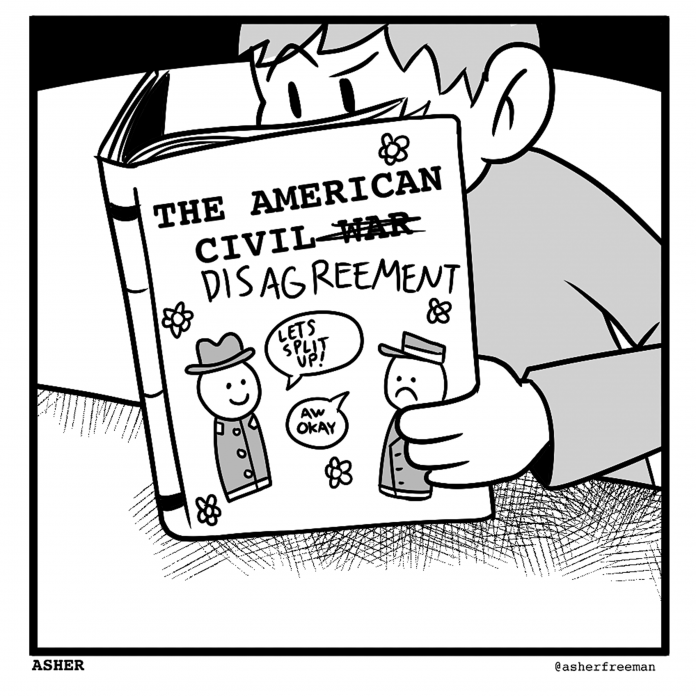Two weeks ago, a Houston parent found that her son’s history textbook referred to slaves as “workers” in a passage. This particular textbook, produced by McGraw-Hill Education, serves nearly a third of high schoolers taking this history course in Texas.
After spreading the word through Facebook, she finally got the publisher to apologize. McGraw-Hill said it would reprint the book with the aforementioned passage changed to “forced migrants,” what it seems to claim is a preferable term.
While this incident might have been portrayed as an accident, it is a symptom of a more sinister trend in education.
We as a society need to ensure we do not whitewash American history education, because we need to understand our history to avoid repeating it.
As a nation with open and fair elections, education is perhaps the most important tool our country has. If people do not understand the issues or context, citizens cannot be trusted with the ability to choose representation. Unfortunately, the education system has been letting citizens down as of late.
This is not the first time Texas has made an effort to ease America’s checkered past, especially in the South. In 2010, the Texas Board of Education changed history education standards to portray slavery as a side issue when it came to the Civil War. Rather, the war was primarily about sectionalism and states rights, according to the new legislation’s stance.
Historical consensus holds that slavery was the driving force of the Confederacy. In fact, the Texas Declaration of Causes mentions slaves 21 times and declares that the “[African Race] were rightfully held and regarded as an inferior and dependent race, and in that condition only could their existence in this country be rendered beneficial or tolerable.”
Perhaps just as damaging, the new state requirements also do not require history classes to address the Ku Klux Klan or Jim Crow. These, along with slavery, are arguably the most defining themes of race relations in this country.
While the Civil War and Reconstruction are consistently the hot-button issues, they are certainly not the only issues glossed over in the education system.
Slavery is a terrible wrong, but it is only one in a line of great ills America produced. American settlers led to the genocide of millions of Native Americans in the new world. More than 100,000 Japanese-Americans were wrangled and put into camps during World War II. Hundreds of thousands of Japanese citizens, mostly civilians, were killed by nuclear bombs in Hiroshima and Nagasaki.
But when American history is taught in schools, these events are virtually glossed over. The main takeaways from American history are not intended to be a long and complex past, but rather the deification of the Founding Fathers and theme of American Exceptionalism.
This shouldn’t mean we ignore the incredible chapters of our history. From invention to exploration to innovation, there are plenty of praiseworthy instances that make us who we are as a nation, and we should take pride in them.
America has an argument to be the greatest civilization ever, and citizens should not lose sight of that. However, changing history education standards to purport the idea of exceptionalism is brash and unproductive.
The fact is America is a flawed nation with a flawed history. This is not something to be ashamed of, but rather something to embrace. Only when we understand and accept our flaws can we reach our potential.






